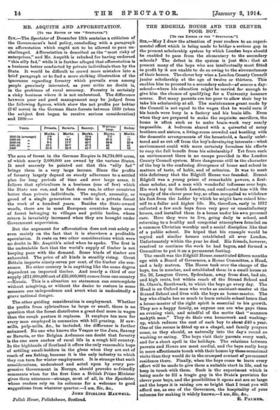THE EDGHILL HOUSE AND THE CLEVER POOR BOY.
fire TIM Manes Or Ilia 5excravo...1 Srs,—May I draw the attention of your readers to an experi- mental effort which is being made to bridge a serious gap in the present scholarship system by which London boys should be enabled to pass from the elementary to the secondaly schools ? The defect in the system is just this that at present many of the boys who are intellectually most fitted to profit by it are unable to do so owing to the circumstances of their homes. The clever boy wins a London County Council junior scholarship at the age of twelve or thirteen. This enables him to proceed to a secondary school—of course a day- school—where his education might be carried far enough to give him the chance of qualifying for a University honours course. But many parents are too poor to allow their boy to take his scholarship at all. The maintenance grant made by the Council is not equal to the wages that he would earn if his hands were busy in a factory and his brain idle. Even when they are prepared to make the requisite sacrifices, the home is often such as to make brain-work very nearly impossible. A. bedroom shared with a quirrerful of noisy brothers and sisters, a living-room crowded and bustling with the domestic arrangements of the household, a family unlet- tered and so out off from the boy's developing interests—what environment could with more certainty foreclose his efforts to reap the full benefit from his scholarship P Yet from such an environment there is no escape provided in the London County Council system. More dangerous still to the character of the boy is the confusing divergence of home and school in matters of taste, of habit, and of criterion. It was to meet this deficiency that the Ede:ill House was founded. Ernest Edghill was a young priest of remarkable powers, a first- class scholar, and a man with wonderful influence over boys. His work lay in South London, and confronted him with tho tragedy of the clever poor boy, so often compelled to withdraw his foot from the ladder by which he might have raised him- self to a fuller and higher life. He, therefore, early in 1912 collected a few such boys from very poor or unsatisfactory homes, and installed them in a house under his own personal care. Here they were to live, going daily to school, and returning to a healthy and congenial atmosphere founded on a common Christian worship and a social discipline like that of a public school. lie hoped that his example would be copied and similar houses established all over London. Unfortunately within the year he died. His friends, however, resolved to continue the work he had begun, and formed a Committee to pot it on a permanent footing.
The result was the Edghill House.constituted fifteen months ago with a Board of Governors, a House Committee, a Head, and a lady matron. The House took over the charge of the boys, ten in number, and established them in a small house at No. 26, Longton Grove, Sydenham, away froze dust, bad air, and high rents, but within reach of the Strand School and St. Clove's, Southwark, to which the boys go every day. The Head is an Oxford man who works as assistant-master at the Strand School and lives with the boys so house-master. The boy who climbs has so much to learn outside school hours that a house-master of the right spirit is essential to his growth. They are a happy family, as anyone can see who pays them an evening visit, and mindful of the motto that "manners rual-yth man." They do their own housework and washing- up, which reduces the cost of each boy to about £40 a year. One of the rooms is fitted up as a chapel, and family prayers come, as they should, as naturally into the days round as washing or eating. The boys visit their parents every week, and for a short spell in the holidays. The relations between parents and House are most cordial, and the boys really keep in more affectionate touch with their homes by these occasional visits than they would do in the cramped contact of permanent residence there. Finally, when the boys come to leave every effort will be made to give them a suitable start in life, and to keep in touch with them. Such is the experiment which is being made to fill a tragic gap in the State's provision for clever poor boys, and the possibilities it opens out are so large and the hopes it is raising are so bright that I trust you will afford me, as one of the Governors, the hospitality of your columns for making it widely known.—I am, Sir, droi, B. PALMER„


















































 Previous page
Previous page